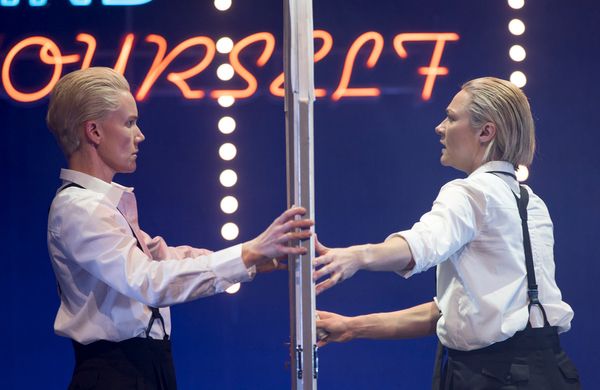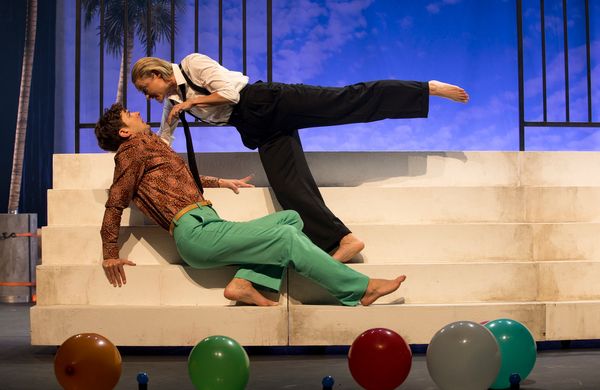FAMILY (MIS)FORTUNES
The Comedy of Errors character lowdown
Duke The ruler of Ephesus is fair minded but, ultimately, her hands are tied by the law which she is duty-bound to enforce.
Egeon A merchant of Syracuse who (illegally) dabbles in a bit of business in Ephesus. Years ago, a shipwreck separated him from his wife and one of his twin sons.
Antipholus of Syracuse Adult son of Egeon, Antipholus is searching for his identical twin brother, from whom he was separated as a baby. As a Syracusan creeping around the enemy territory of Ephesus, he’s understandably jumpy and paranoid.
Antipholus of Ephesus The long-lost twin son of Egeon has grown up to become a respected merchant in Ephesus, with friends in high places (the Duke among them). Antipholus is prone to temper tantrums with servants, and flirtations with courtesans, but it’s his wife Adriana who wears the trousers. (Handy hint: This Antipholus doesn’t pop up in the play until Act 3.)
Adriana Passionate and hot-tempered wife of Antipholus of Ephesus. She’s unimpressed with the patriarchy of Ephesus, suspicious of her husband’s frequent absences, and unafraid to speak out.
Luciano Adriana’s brother is a serial singleton who desperately wants to “learn to love”. In many ways, Luciano is more conservative than his fiery sister – although he shares a remarkably similar taste in men.
Dromio of Syracuse Loyal, wisecracking, and long-suffering servant of Antipholus of Syracuse. Dromio has a long-lost identical twin.
Dromio of Ephesus Brow-beaten servant to Antipholus of Ephesus, who routinely gets caught in the crossfire between his master and Adriana. Identical twin of Dromio of Syracuse.
Emilia After the trauma of losing her husband (Egeon) and her sons (the Antipholus twins), Emilia found God and now runs a nunnery in Ephesus. She offers some (occasionally misguided) marriage counselling to the locals.
Courtesan A call girl who may or may not have a thing going with Antipholus of Ephesus (depending on who you ask). Certainly, it is the Courtesan who Antipholus turns to when his wife locks him out of the house.
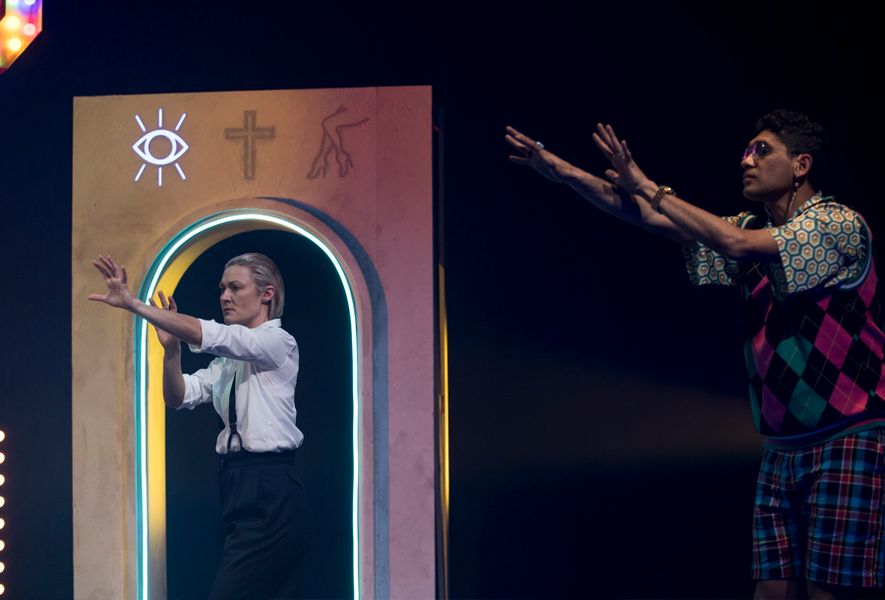 Julia Billington as Dromio of Syracuse and Joseph “Wunujaka” Althouse as Luciano (2022, photo by Brett Boardman)
Julia Billington as Dromio of Syracuse and Joseph “Wunujaka” Althouse as Luciano (2022, photo by Brett Boardman)
 Lauren Richardson as Courtesan (2022, photo by Brett Boardman)
Lauren Richardson as Courtesan (2022, photo by Brett Boardman)
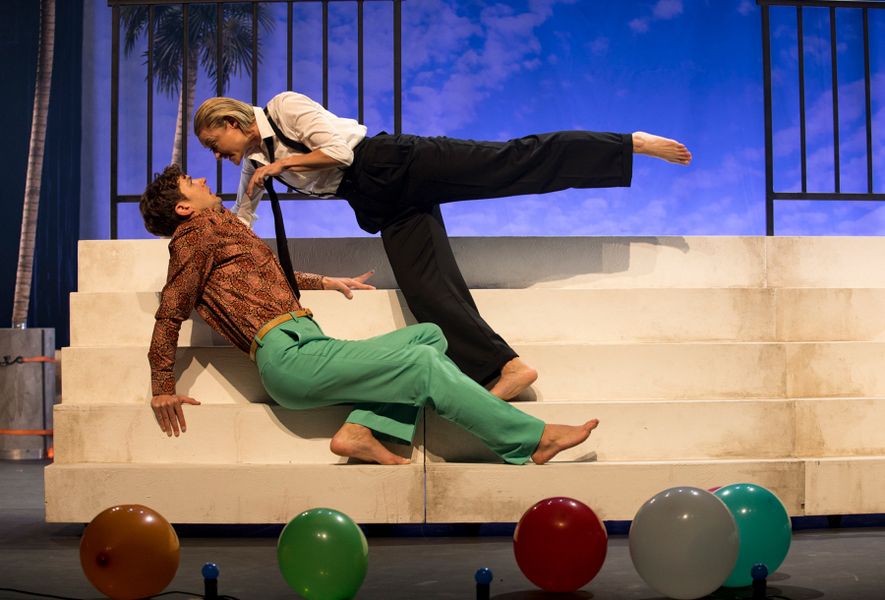 Skyler Ellis as Antipholus of Ephesus and Julia Billington as Dromio of Syracuse (2022, photo by Brett Boardman)
Skyler Ellis as Antipholus of Ephesus and Julia Billington as Dromio of Syracuse (2022, photo by Brett Boardman)
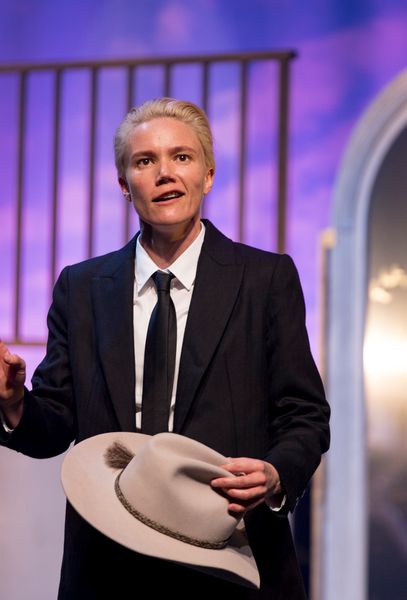 Ella Prince as Dromio of Ephesus (2022, photo by Brett Boardman)
Ella Prince as Dromio of Ephesus (2022, photo by Brett Boardman)
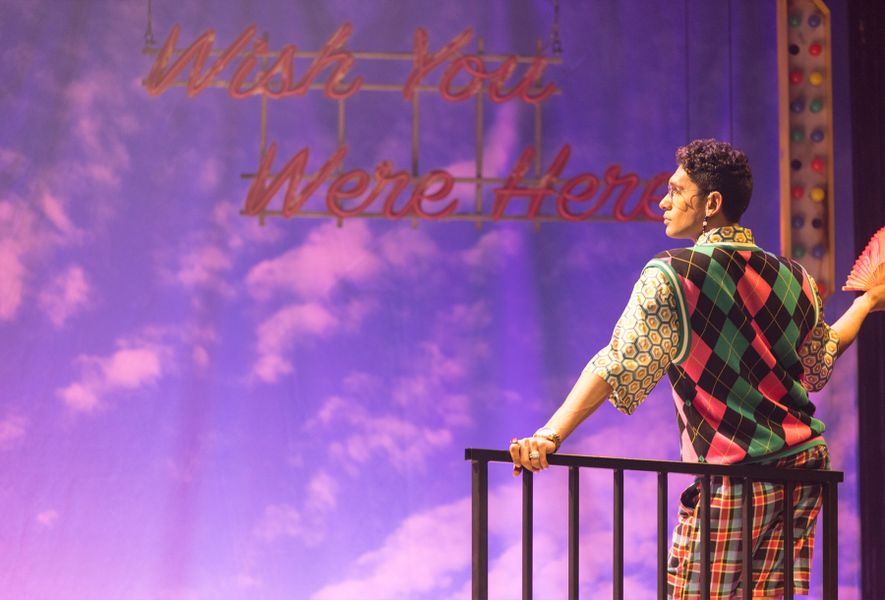 Joseph ‘Wunujaka’ Althouse as Luciano (2022, photo by Brett Boardman)
Joseph ‘Wunujaka’ Althouse as Luciano (2022, photo by Brett Boardman)
 Joseph ‘Wunujaka’ Althouse as Luciano and Skyler Ellis as Antipholus of Syracuse (2022, photo by Brett Boardman)
Joseph ‘Wunujaka’ Althouse as Luciano and Skyler Ellis as Antipholus of Syracuse (2022, photo by Brett Boardman)
 Felix Jozeps as Antipholus of Ephesus (2022, photo by Brett Boardman)
Felix Jozeps as Antipholus of Ephesus (2022, photo by Brett Boardman)

